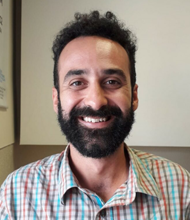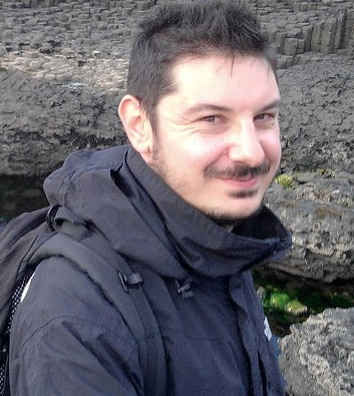News
“The Prince Claus Chair gave us an opportunity to solidify meaningful collaborations”
An update of Gustavo García López and Diego Andreucci on their work.
As of the 1st of September 2019 Dr Gustavo García López holds the Prince Claus Chair for a period of three years (officially it’s a two year tenure, due to the pandemic it has been extended one year) at the International Institute of Social Studies (ISS), part of Erasmus University Rotterdam.

In March 2020 he was joined by Dr Diego Andreucci as the Postdoctoral Researcher for this Chair. Their thematic focus is on ‘Sustainable Development, Inequalities and Environmental Justice’. A reflection on their work for the Chair so far and their perspectives on what to look forward to.

The double-edged sword: no fieldwork, more time for reflection
“The current pandemic has been a challenge in many different ways”, Gustavo starts. “It’s been rough mentally and physically, but I realise I’ve also been privileged to have this job and felt the freedom and opportunity to pivot from our original plans.” I’m happy that the Prince Claus Chair gave me the opportunity to continue doing what I already did, but within a new space and with their support. It opened doors for me that wouldn’t normally have. For example becoming part of the Coordinating Team of the 2021 Degrowth Conference that’s going to be organised in The Hague and being appointed Technical Chair of the International Advisory Council of the NWO Funding Call “SDG Interactions and Policy Interventions in Developing Countries. Both of these opportunities emerged specially due to my appointment as Prince Claus Chair.”
Diego chimes in: “We had to cancel all our fieldwork plans and in-person events and meetings. We really needed to rethink our strategy from scratch.”
Gustavo continues: “This situation gave us the opportunity to reflect on our work. What did it mean to have no fieldwork done and thus no ‘new’ data? Do we rely on the fieldwork too much sometimes? How much do we actually already know? How do we use this knowledge? Do we ponder over and reflect on it? How do we disseminate our knowledge in to actionable intervention? This was a time where we could actually address some of these questions.”
Engaged research
“For us that meant drawing upon our existing network, for example our platform and research collective undisciplinedenvironments.org and other – then somewhat dormant – connections and start to revitalize and solidify those networks”, says Diego. Gustavo adds: “This resulted in more reflective work: essays, blogs and such. We’re currently editing three volumes. One on global social-environmental movements as forces of systemic transformation with Diego, one on just transitions and Green New Deals in Puerto Rico, and one on the Environment in Latin America. In all of these a central aim is to offer scholar-activist reflections on these themes in accessible and engaging formats, for academics but also for a broader audience beyond the university walls.”
“As mentioned, Gustavo and I are involved with the Degrowth Conference 2021”, Diego mentions. “We’re part of the coordinating group of the theme of Green New Deals, and we’re organising a series of events within this theme, including a workshop with activists from across the world on “Campaigning for a Green New Deal Beyond Growth” and a Panel on “Political Ecologies of the Green New Deal”, based on a special issue we are coordinating with other colleagues.”
Diego emphasises: “Let me be clear. The practise of refection and taking stock of what’s already there, to engage in slow academia or engaged research does not mesh easily with the way academia is currently organised: pressures to publish relentlessly in high ranking journals, competition for grants, etc.” The way we handled this, in part, was by integrating this reflexive and collaborative praxis in our publishing. For instance, we’ree working on an edited volume provisionally titled Insurgent Ecologies, currently being reviewed by Pluto Press, where, instead of producing new data on environmental justice movements, we have invited engaged researchers and activists already involved with such movements to reflect on their potentialities and challenges for achieving emancipatory, systemic change.”
Gustavo adds: “Another way of engaging is to get organised via the (faculty) union or another way to start the conversation to rethink how academia conducts their business. How to encourage and reward reflection or other ways of doing research is an important topic that we need to address collectively in the academia.”
Merging research with interventions
For the upcoming months, this means continuing their ongoing projects, and also tentatively looking forward to meeting in person.
Diego: “We hope to get more in-person events going as of September, although that’s still uncertain. We would like to do workshops for example based on our reflections in our upcoming books.”
Gustavo adds: “And come up with more engaging ways to disseminate our research outside of academia. We’re thinking for example about enriching our platform undisciplinedenvironments.org with podcasts, conversations or spoken or visual art. We also want to continue focussing on building lasting collaborations, to integrate what we have into something meaningful and new, to solidify our current networks and not keep searching for new, new, new. I want to combine this with doing meaningful interventions locally. For instance, we’re planning a project together with local researchers an civil society organisations in Portugal to foster re-claiming of communal governance of forestlands. This project is a research-action initiative that would organise local deliberative planning workshops and participatory documentary-making in rural communities, along with international ‘encounters’ with other, similar communities across Europe.”